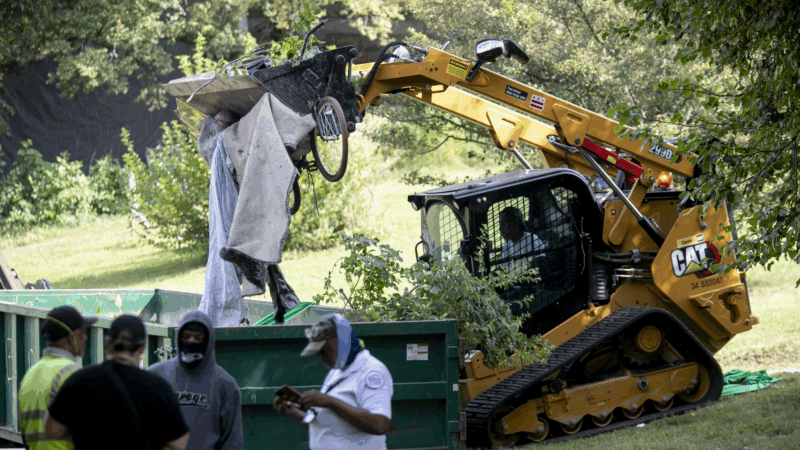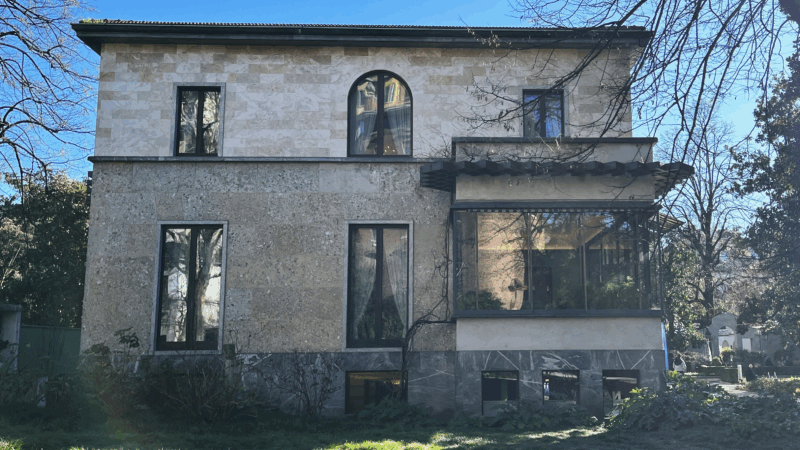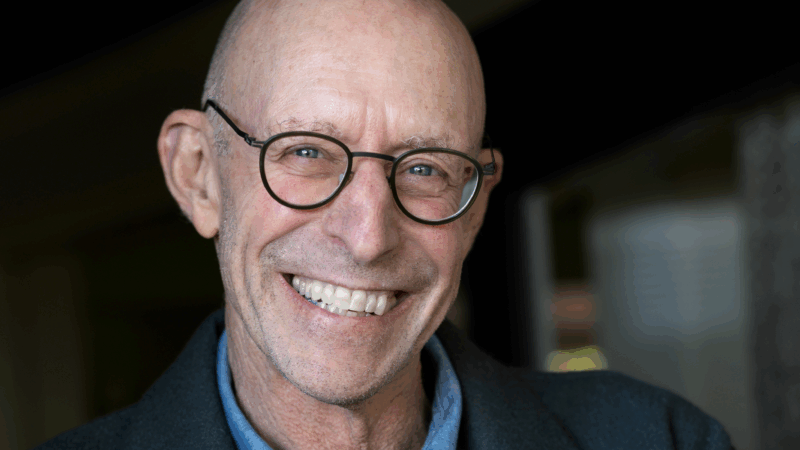Trump’s purge of Washington’s homeless encampments escalates
WASHINGTON — Just before mid-day Thursday, crews here moved into a grassy park near the Lincoln Monument in the nation’s capital, dismantling one of the small homeless encampments that’s drawn the ire of President Trump.
David Beatty, age 65, looked on as a bulldozer scooped up tents and other belongings and shoveled them into a garbage truck.
“It just feels wrong to me. The idea that we’re poor makes them uncomfortable. They don’t want to be reminded that poor people exist,” he said. Asked where he expects to sleep, Beatty shook his head and said quietly, “I don’t know. I don’t know.”


During a press conference this week at the White House, Trump lumped unhoused Americans like Beatty, together with criminals, people experiencing drug addiction and mental illness and said they all must leave the streets or vacate D.C. immediately.
“We’re going to be removing homeless encampments from all over our parks, our beautiful, beautiful parks, which a lot of people can’t walk on, they’re very dirty,” Trump said. “There are many places they can go, we’re going to help them as much as you can help. But they’re not going to be allowed to turn our capital into a wasteland,” he added.
Activists and experts on homelessness generally agree that roughly 800-900 people sleep on Washington’s streets on any given night in the summer. Many of them, like Beatty, say they don’t have safe, affordable options as camps like this one are uprooted.



As Jessy Wall packed his belongings into plastic garbage bags, he told NPR he doesn’t feel comfortable in D.C.’s shelters. “No, I don’t want to be there. Shelters are not the best option because they cram people in there and you don’t always sure of who is who,” Wall said.
Dana White is with a group called Miriam’s Kitchen that works to end chronic homelessness in Washington. He said Trump’s purge of people without housing doesn’t address the underlying lack of affordable housing.
“We’re simply moving the problem around, we’re not really providing a solution to folks homelessness,” White said. “D.C. shelter capacity is often very limited. Ultimately these people often have no permanent, stable place to go.”


Activists from Miriam’s Kitchen and other groups showed up on Thursday to help people break down their tents. They also offered people guidance on healthcare, drug treatment and other services, and tried to move as many of the displaced as possible into shelters.
Christian Watkins, a Methodist minister from a local church, held a sign that quoted Scripture from the Bible. “What does it profit a man to gain the whole world but to lose his soul,” Watkins said, reading aloud. “The soul of America is lost because of the fact this is allowed to happen.”
Asked what he thought of Trump’s argument that homeless camps are eroding Washington’s quality of life, making it less safe and less beautiful, Watkins said, “We do have a beautiful city. But to turn a blind eye to the systemic problems that not only this District but the country have, not caring for the least of these, that’s the real problem.”


As this ragged, fragile tent community was dismantled, many people who’ve called this place home appeared frightened and confused. George Morgan, age 65, lives with his dog Blue. He described himself as a devout Christian and said he prays regularly for President Trump.
Asked where he and Blue will sleep now, Morgan said he hoped Trump would help answer that question. “There are some hotels that are pet friendly. Maybe the President will put me up in a hotel. That’s our President, correct?”
But White House officials say they’ve already purged roughly 70 tent encampments from the Washington area and they’ve made it clear that Morgan and others living on the streets must leave D.C. or find their way into shelters immediately. According to White House spokeswoman Karoline Leavitt, those who don’t do so will face punishment in the form of fines and jail time.
Transcript:
ARI SHAPIRO, HOST:
Crews here removed a homeless camp near the Lincoln Memorial today. President Trump has demanded that people living on the streets and in parks be removed immediately as part of what he describes as an effort to make the nation’s capital safer and more beautiful. As NPR’s Brian Mann reports, many people without housing say they have nowhere to go.
(SOUNDBITE OF VEHICLE BEEPING)
BRIAN MANN, BYLINE: Mid-morning city crews – including a dump truck and a small bulldozer – rumbled into a grassy park in downtown Washington, hauling away tents and other belongings. David Beatty, a bearded man in his 60s, who’s lived in a tent here for months, says he has no idea where he’ll go next.
DAVID BEATTY: I don’t know.
MANN: Beatty says homeless camps like this would make a lot of people, including President Trump, uncomfortable. But he says he never expected to see Americans without housing purged from the city’s streets.
BEATTY: Just feels wrong to me. The idea that we’re poor makes him uncomfortable, and they don’t want to be reminded that poor people exist.
MANN: During a press conference this week at the White House, the president lumped people like Beatty, who are unhoused, with criminals and gang members. Trump said they all have to go.
(SOUNDBITE OF PRESS CONFERENCE)
PRESIDENT DONALD TRUMP: There are many places that they can go. And we’re going to help them as much as you can help. But they’ll not be allowed to turn our capital into a wasteland.
MANN: Advocates and experts on homelessness say there are roughly 900 people living on the streets of the nation’s capital on any given night. And they say there aren’t enough good places for most of them to go. Dana White is with a group called Miriam’s Kitchen that works to end chronic homelessness in Washington.
DANA WHITE: We’re simply moving the problem around. We’re not really providing a solution to folks’ homelessness. D.C. shelter capacity is often very limited. Ultimately, these people have no stable, permanent place to go, so we’re just shuffling them from one place to another.
MANN: Activists from Miriam’s Kitchen and other groups showed up here to help people break down their tents, offering guidance, trying to move as many as possible into shelters. As the camp is taken apart, Christian Watkins, a Methodist minister from a local church, holds a sign with a verse from scripture.
CHRISTIAN WATKINS: Mark 8:36 – what does it profit a man to gain the whole world but to lose his soul? The soul of America is lost because of the fact that this is allowed to happen.
MANN: What do you say to people who say, look, we want to have beautiful parks, we want to have a city that looks stable and safe and comfortable?
WATKINS: We do have a beautiful city. But to turn a blind eye to the systemic problems that not only this district but also the country has in not caring for the least of these, that’s the real problem.
MANN: As this ragged, fragile community is dismantled, many of the people living here appear frightened and confused. Jessy Wall is a young man who describes himself as gay. As he packs his belongings into garbage bags, Wall says he doesn’t feel safe in shelters.
JESSY WALL: No, I don’t want to be there. Shelters are not the best option because they cram people in there, and you’re not always sure of who is who.
MANN: A short walk away, I meet George Morgan, who’s 65 and lives with his dog Blue.
(SOUNDBITE OF DOG BARKING)
MANN: He describes himself as a devout Christian who prays regularly for President Trump. He doesn’t know where he and Blue will sleep tonight.
GEORGE MORGAN: There are some hotels that are pet-friendly. Maybe the president put me up in a hotel.
MANN: Donald Trump might put you up in a hotel?
MORGAN: The president, yeah. That’s our president, correct?
MANN: But White House officials say Morgan and the others living here must leave D.C. or find their way into shelters immediately, or they’ll be punished with fines or jail time.
Brian Mann, NPR News, Washington.
R&B stars consider two ways to serve an audience
Two albums released the same day — Jill Scott's return from a long absence, and Brent Faiyaz's play for a mid-career pivot — offer opposing visions of artistic advancement in the genre.
Baby chicks link certain sounds with shapes, just like humans do
A surprising new study shows that baby chickens react the same way that humans do when tested for something called the "bouba-kiki effect," which has been linked to the emergence of language.
American Jordan Stolz speedskates to a third Olympic medal — silver this time
U.S. speedskater Jordan Stolz had a lot of hype accompanying him in these Winter Olympic Games. He's now got two gold medals, one silver, with one event to go.
Bad Bunny and J. Cole rule the pop charts
These days, the Super Bowl halftime show is a massive driver of the streaming, airplay and sales that fuel the Billboard charts. This week, Bad Bunny benefits from that influence.
Reporter’s notebook: My Olympic Lunar New Year
An NPR reporter covering the Olympics in Milan takes us on cultural side quests, to a hospitality house and a candy store.
Michael Pollan says AI may ‘think’ — but it will never be conscious
"Consciousness is under siege," says author Michael Pollan. His new book, A World Appears, explores consciousness on both a personal and technological level.








